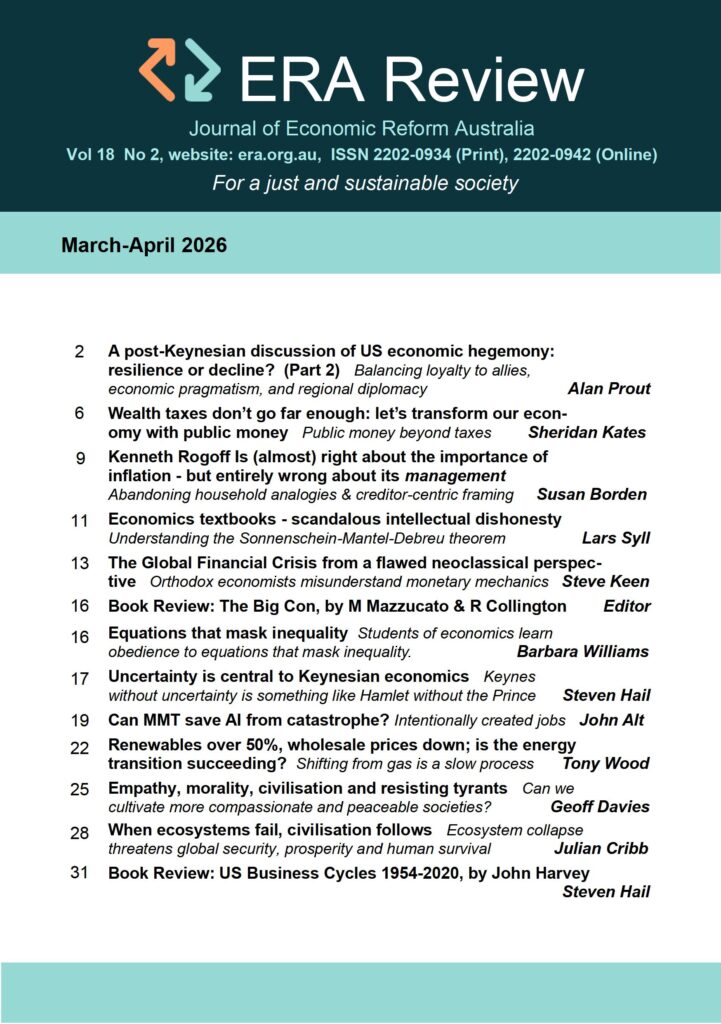Inequality is exacerbating the health, housing and education crises
David Shearman
A broken promise is of no consequence when the sum of $254 billion currently budgeted for tax relief does little to ameliorate the deteriorating state of the nation’s health, social problems, aged and disability services, and the need for educational revival. A similar amount could be profitably budgeted for direct spending by the federal government, for the purpose of addressing all of these needs.
The health of Australians is deteriorating. Good health is not only what our doctors and nurses can offer us but according to the World Health Organisation, our health also depends on many non-medical factors such as the conditions in which we are born, grow, work, live and age. Health is also affected by economic policies and political systems.
Currently, the health of many Australians, particularly the Indigenous people, is affected by all these factors, the most important today being housing and education and both could be quickly improved by increased funding commencing immediately. Housing is a human right and under international law, to be adequately housed means having secure tenure.
This provides a sense of safety, emotional stability and a better chance of employment. In our rich country, the level of public housing has hardly increased in more than 20 years, during which time our population has increased by about 30%.

According to Sustainable Population Australia, we now expect to receive an extra 650,000 migrants during 2023 and 2024, which will drive a 900,000 surge in total population. Much of the increase arises because we have not trained enough applicants for essential tasks and we don’t pay them enough. This is madness considering the state of housing and the many other needs of immigrants.
How can this be? Immigration policy is a shambles and we don’t have a population policy that would consider the mentioned needs rationally. In addition much housing has become a commodity to be traded as an investment with tax advantages for the better off. It is not regarded as a public necessity.
Good education is a prerequisite for health for it offers opportunities to employment as well as social interaction and a sense of fulfilment. Section 27A of the Human Rights Act 2004 says that ‘Every child has the right to have access to free school education appropriate to his or her needs’.
Today in this rich country, educational standards are declining, teachers are underpaid and leaving the profession in despair, there is cyber-bullying at schools, disorder in classrooms and many more children are becoming mentally ill. The gulf between private and public education widens. Good schooling should offer a foundation for life for many disadvantaged children. Again, we must ask how this could have occurred in our wealthy nation.
The other pillar of education, the universities, are in disarray, severely lacking funding as well as visionary management, and with much reliance on temporary teaching staff. For many students, it is nothing more than the road to a job.
A recent report of the Australia Institute [1] provides part of the answer to all these woes addressing inequality.
Governments rise and fall on a promise of economic growth. The report indicates that 93% of the benefits of economic growth between 2009 and 2019 went to the top 10% of earners, while the other 90% of earners received just 7%. And this disparity increased during a time of relative prosperity.
The nation is now threatened by inflation. More nurses, teachers and aged care workers cannot afford housing on their poor remuneration and now – beset by inflation -they are quitting their vocation. But an even greater problem is arising the collapse of basic health services which are becoming unavailable to many and particularly the poor. However more services are needed to help with an increasing range of mental disorders from rapid changes in society and the lack of direct positive social interaction in social media, as well as the lack of housing, and the other health-giving needs mentioned above. All these facts are interrelated.
Add to this list of woes the increasing harm to health from climate change, heat exhaustion and deaths, floods, fires and homelessness. Epidemics are increasing worldwide caused by expansion of the population into the habitat of wildlife carrying infections. We are also faced with more diseases from PFAS and plastic particles now ubiquitous in the human body. More funding is needed to cope.
Health service collapse in the West is most marked in Canada, the USA, the UK and Australia. All of these countries have failed to fund their health services in times of prosperity. Why? Their governments are besotted by the fruits of neoliberal capitalism. A recent article in Eureka Street – ‘It’s time we ended politically induced poverty’ [2] notes that this economic philosophy:
“…saw both the systematic dismantling of essential social infrastructure (including social security) and the strategic undermining of the capacity for working people to collectively organise and bargain for decent pay and conditions”
Where have these policies gotten us? A place where multinational corporations are encouraged to avoid taxes; a place where precarious work has been normalised, effectively rendering the minimum wage and minimum working conditions meaningless for many.
This should lead us to reflect on the launch in 1948 of the UK National Health Service with free health care for all at a time of huge national debt, poverty and devastation from war.
Aneurin Bevan, the visionary health minister, recognised that improved health meant better morale, a vision of a better future and healthier workers. Within five years, elderly ladies stood smiling at their house gates to show with pleasure their new teeth replacing the spaces and rotting teeth. I worked devotedly in that health service and it was a joy to do so.
In the ’70s, the UK moved to prosperity and corporatism and the service began its steady decay, heralded today by hundreds of health workers now applying for jobs in Australia where our deteriorating service is still better than theirs.
The greatest threats facing Australia today include climate change and environmental degradation. These are not always apparent to us except when fire, flood or storm renders us homeless. We need urgent and decisive action equivalent to wartime measures.
We must come together in adversity and this requires a great reduction in inequality, which can be achieved by adopting appropriate fiscal measures in order to improve the health and living standards for all.
Promises are important in politics, but when you look at the state of the nation, the Treasurer has a higher duty to the nation than the imposition of Stage 3 tax cuts (amounting to $254 billion over 10 years). The federal government’s higher duty entails a commitment to a program of direct federal government spending of a similar magnitude or greater on the nation’s health, housing, educational services and social services. Such a program also must go hand-in-hand with progressive taxation reform in order to reduce inequality. The overriding reality is that the federal government, being a monetary sovereign, is not constrained in its spending by the level of taxation that it imposes on its citizens. The only constraint on federal spending is the availability of real resources. The primary purposes of federal taxation are (a) to reduce aggregate demand by an amount which nullifies most of the inflationary impact of the government’s spending, and (b) to provide the government with an additional economic tool for managing social inequality which can be reduced significantly by a suitable system of progressive taxation.
Finally, it is important to recognise that current economic theory and practice is not yet a science. The economy is like baking a cake, sometimes it rises and sometimes it falls. When it rises and is tasty, it is gobbled by the rich and the poor eat crumbs. As the French Revolution reached its peak, Marie Antoinette, referring to the poor and hungry, is widely thought to have said dismissively, “Let them eat cake”. The guillotine awaited her. Politicians, take note.
- https://australiainstitute.org.au/post/between-the-lines-newsletter-12-4-2023/
- https://www.eurekastreet.com.au/itstime-we-ended-politically-induced-poverty
Dr David Shearman AM is Emeritus Professor of Medicine at Adelaide University, co-founder of Doctors for the Environment Australia, and is also an ERA patron..































